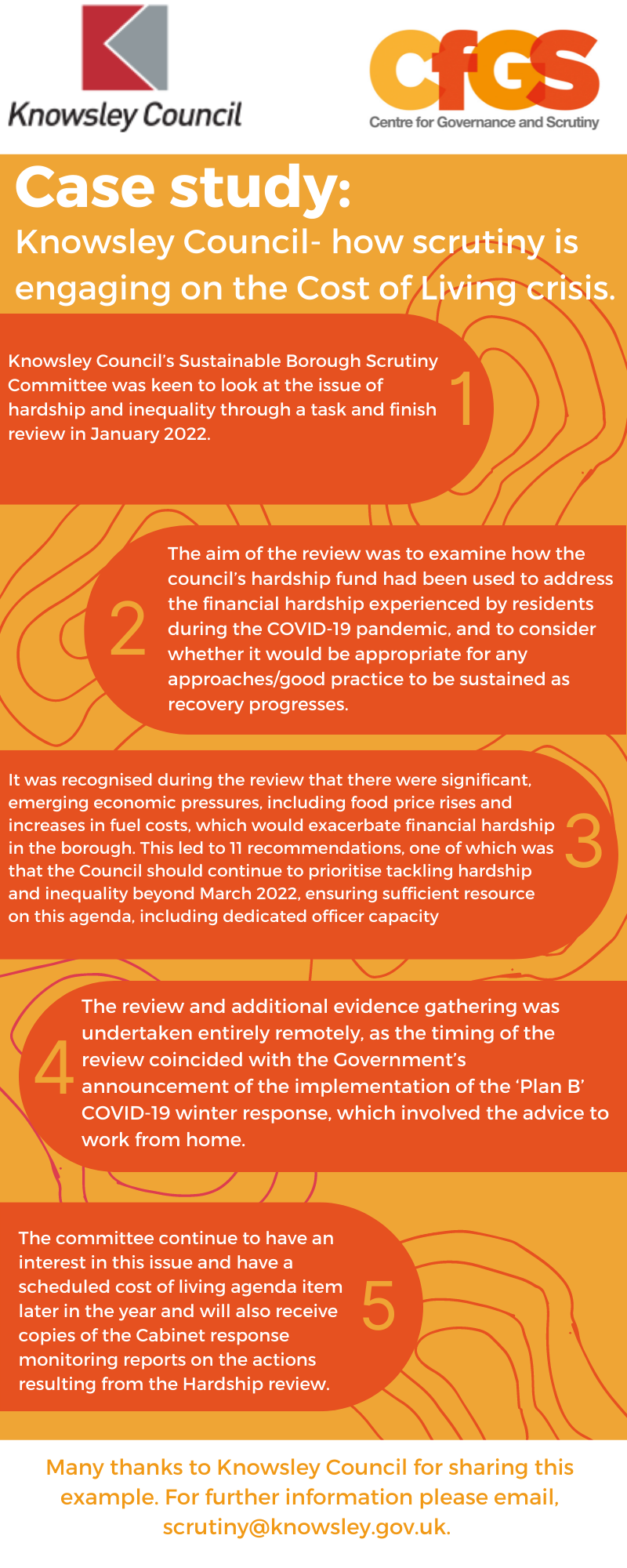Cost-of-Living Information Digest by Megan Ingle and Camilla De Bernhardt-Lane
Cost-of-living Information Digest by Megan Ingle and Camilla De Bernhardt-Lane
The UK is currently in the midst of a cost-of-living crisis. Soaring fuel and food prices alongside rising interest and inflation rates are leaving people in dire financial situations. According to data from Citizens Advice more people are hitting crisis point than in previous years, record numbers of people are using food banks and are unable to top up their pre-payment energy meters. The cost of living has been increasing since early 2021, but for more than a decade, local authorities have had to grapple with the challenges of households struggling to make ends meet. This complex picture is too vast for one organisation to deal with, but with local councils on the frontline, how can they best deal with these issues and alleviate pressures for its constituents?
We wanted to put together an ‘information digest’ for local authorities undertaking, or planning to undertake, research on the cost-of-living crisis. In doing so we believe that there are two areas of focus that are relevant, these two areas are distinct but related.
The first is the impact upon people, for example residents and businesses in an area. When thinking about these cohorts here are some questions you may want to explore (and likely are already!)
- What are the pinch points and how do we understand and model the impact? This will include, but not be limited to energy costs, inflation on consumables, house prices/rents and the essentials that people need to survive.
- Does the council have sufficient data and information with regards to its constituents? For example, are you aware of and able to reach your most vulnerable constituents and are your services accessible?
- Does your Council have strong links with statutory, community-based services and the independent sector? How are you hearing from these groups at this time?
- What is within the ability of the Council to support
- Are you looking at examples of best practice from other councils? This may be useful in examining other ways of enacting policy/modelling.
In relation to the above, here are some resources that may be of use:
- The LGA has a really useful cost-of-living hub (Cost of living hub | Local Government Association) which has been designed to share best practice and help councils to support their residents with the rise in the cost of living.
- In terms of data relating to the cost-of-living crisis, Citizens Advice has a cost-of-living data dashboard: CA cost of living data dashboard | Flourish this is updated monthly, and they also have a monthly briefing which is incredibly useful.
- The House of Commons Library, as a general resource, is very helpful, they post regular, well-researched briefings on a number of topics. Their cost-of-living briefing can be found here: Rising cost of living in the UK – House of Commons Library (parliament.uk)
- Here at CfGS we regularly do call-outs for case studies which we share amongst our broad network of scrutineers and local authority colleagues, below is an example of a case study that we received from Knowsley Council about their approach to the cost-of-living crisis

The second area that we want to focus on, is council impact. What we mean by this by this, is looking at how the cost-of-living crisis has impact upon the council already and then also examining the predictions on the impact this will have on Council services and budgets. This is particularly timely in considering the budget setting rounds in the New Year. The impact is likely to be unevenly felt – raising income for staff and supporting social care fees will not be the same percentage increase as for buying in tarmac and resurfacing roads, yet both will have an impact and need consideration. The Council organisations such as LGA, ADASS, ADEPT, ADCS will likely have views/guidance on these.
Below are some other useful resources that local authorities may find useful:
- LGiU’s cost-of-living hub: Bundle: Cost of living crisis – LGiU
- The GOV.uk cost-of-living hub: Cost of living support – GOV.UK (www.gov.uk)
- ONS survey: The rising cost of living and its impact on individuals in Great BritainThe rising cost of living and its impact on individuals in Great Britain – Office for National Statistics (ons.gov.uk)
- The Centre for Progressive Policy has lots of great resources: Publications | CPP (progressive-policy.net)
- Mapping economic inequality in the UK: Mapping inequality in the UK (ons.gov.uk)
- How much does the poverty premium cost your constituency? Poverty Premium – Fair By Design
- Data on financial hardship and vulnerability in your area: Financial hardship and economic vulnerability in Peterborough | LG Inform (local.gov.uk)
- Supporting residents with the increased cost-of-living: Supporting residents with the increased cost-of-living: Behavioural science (hertfordshire.gov.uk)
CFGS is always interested to share great practice and champion examples of policy and issue-led Scrutiny. Please let us know how any work that you undertake engages with these issues.




